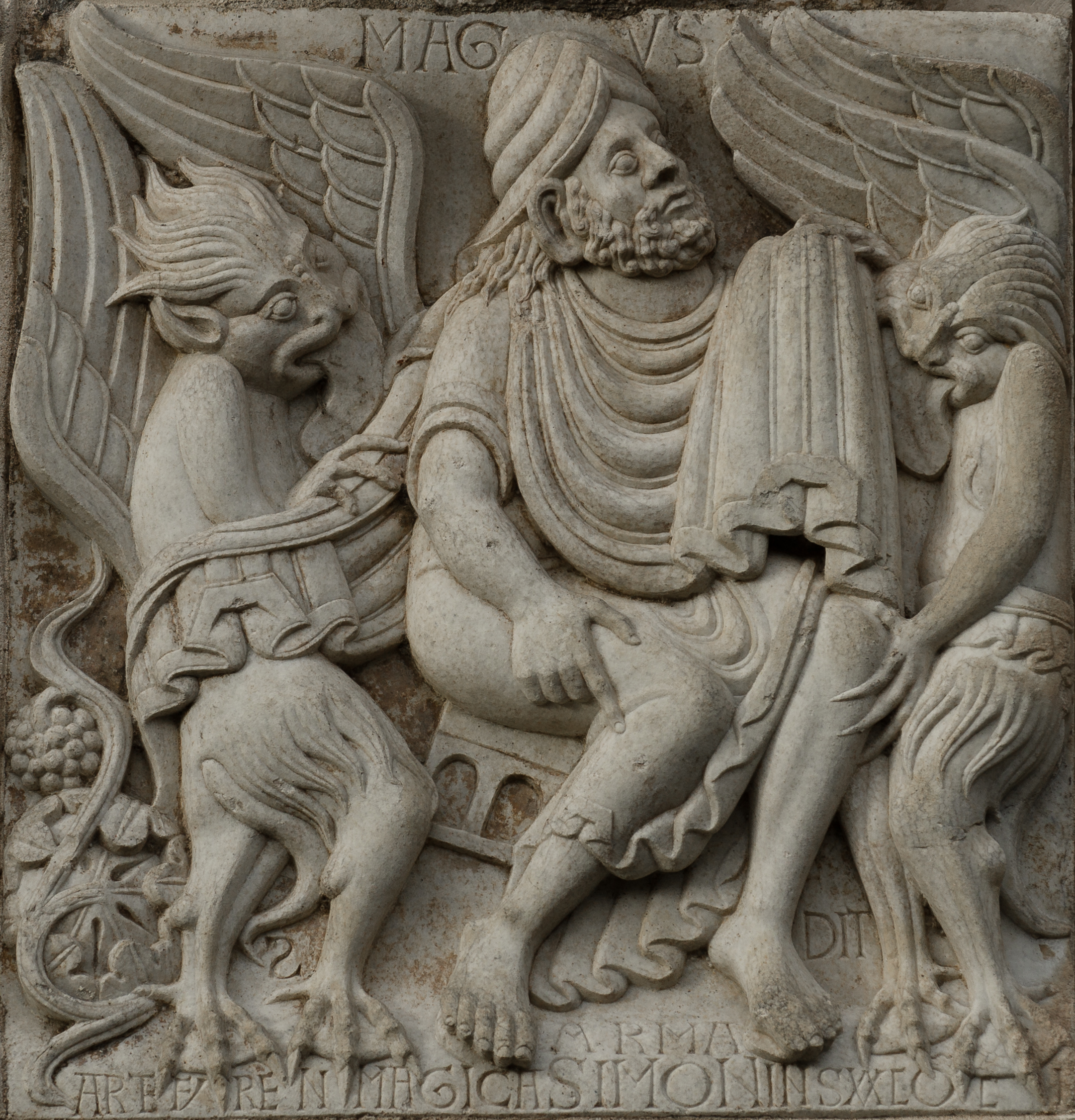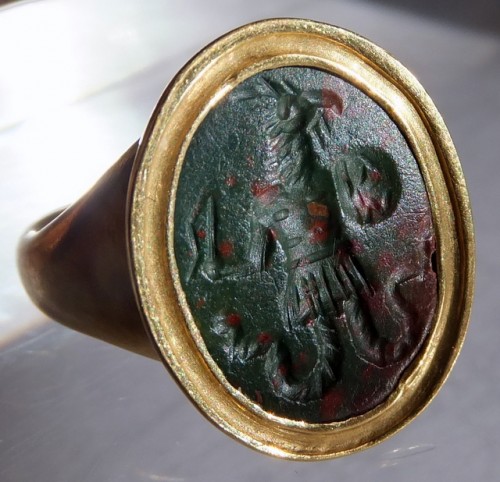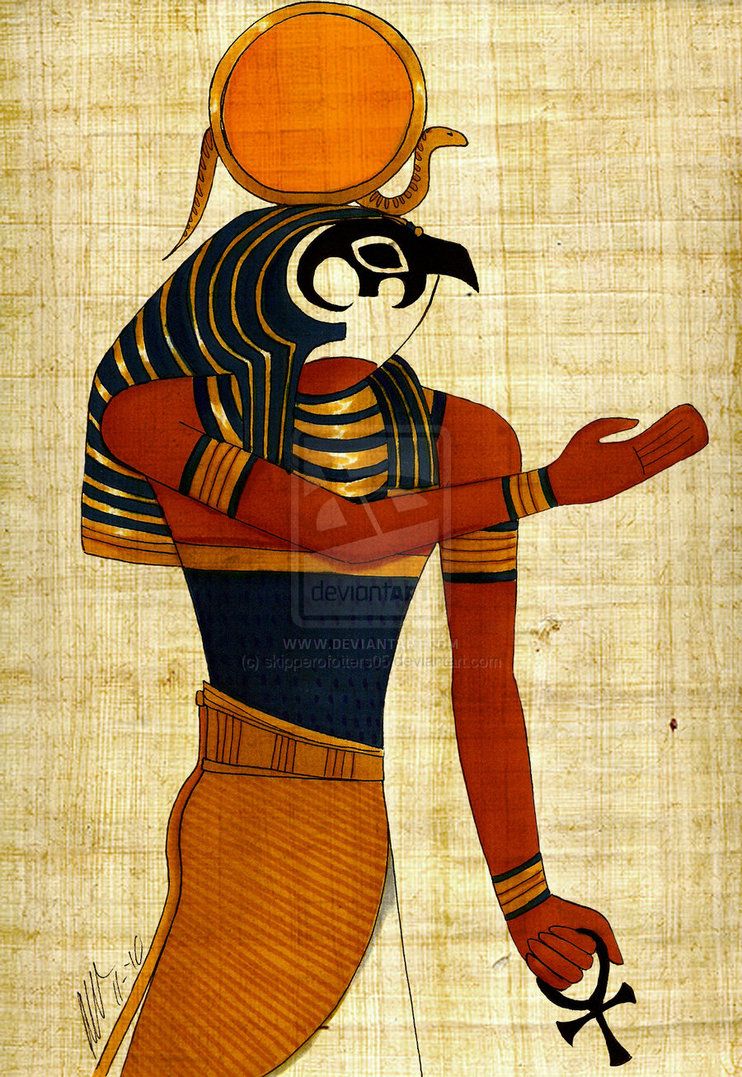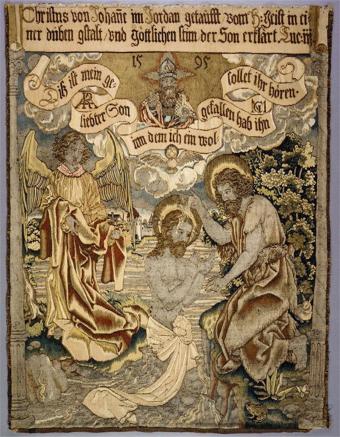In Part 1, I discussed the essence of Gnosticism. It is a Satanic counterfeit to True Christianity. It paints the Old Testament God as an evil being, and presents "Jesus" as the son of a supposedly "higher" god the Jews knew nothing about.
In Part 2, I will go into detail on where this religion started. It began in the pages of the New Testament, with a man referred to by scripture as Simon of Samaria (Acts 8). The Book of Acts describes the original encounter the apostles had with this magician and how that encounter led to conflict and warnings, but it's when you look into the writings of Christian leaders from the next century that you get the full story of what happened afterwards. I will not be covering the doctrines Simon taught regarding sexual sin here. That will be for next study. But I will here give this brief history of how the religion started first, and it is an interesting study in how this battle all began long ago.
God bless to all who read the following,
- H
The Early History Of Simon: The Sorcerer Of Samaria
- The following passage in Acts describes the churches first encounter with Simon the Magician, the man who would go on to become one of the early church's worst and most dangerous spiritual enemies:
- Now for some time a man named Simon had practiced sorcery in the city and amazed all the people of Samaria. He boasted that he was someone great, and all the people, both high and low, gave him their attention and exclaimed, “This man is rightly called the Great Power of God.” They followed him because he had amazed them for a long time with his sorcery. But when they believed Philip as he proclaimed the good news of the kingdom of God and the name of Jesus Christ, they were baptized, both men and women. Simon himself believed and was baptized. And he followed Philip everywhere, astonished by the great signs and miracles he saw.
- When the apostles in Jerusalem heard that Samaria had accepted the word of God, they sent Peter and John to Samaria. When they arrived, they prayed for the new believers there that they might receive the Holy Spirit, because the Holy Spirit had not yet come upon any of them; they had simply been baptized in the name of the Lord Jesus. Then Peter and John laid their hands on them, and they received the Holy Spirit.
- But Simon, having seen that the Holy Spirit was given by the laying on of the apostles’ hands, offered them riches, saying, “Give me this authority as well, so that on whomsoever I may lay my hands, he may receive the Holy Spirit.” But Peter said to him, “May your riches come to ruin with you, because you thought that the gift of God could be obtained by riches. There is no part nor share for you in this matter, for your heart is not right before God. Repent, therefore, of this your wickedness, and ask the Lord God if [this] thought of your heart may truly be forgiven you. For I perceive that you are subject to the poison of bitterness and the bond of iniquity." And having answered, Simon said, “You pray to the Lord on my behalf, so that nothing which you have spoken may come upon me.”(Acts 8:9–24)
- Some writers claim Simon only faked being a Christian during this time, but the passage above strongly suggests he truly did believe only that had some grave spiritual weaknesses: Due to his subjection to demons, Simon was filled with bitterness and also addicted to sin. As Peter said to him:
- Repent... and ask the Lord God if [this] thought of your heart may truly be forgiven you. For I perceive that you are subject to the venom of bitterness, and the bondage of iniquity. (Acts 8:23)
- The word picture used here suggests that Simon's true spiritual state was revealed to Peter by God, and possibly through a vision. The words, "For I perceive that you are subject to the venom of bitterness, and the bondage of iniquity" paint the picture of a man entwined with serpents who were biting into his body and filling him with poison. The Greek word used here was used to translated a Hebrew word that referred to the poison snakes filled their victims with. In other words, Peter saw through the Spirit of God that Simon remained bound by demonic spirits who were still holding him in bondage to both sexual immorality and bitterness towards others. Not by coincidence, Simon was nearly always depicted by church artists as surrounded by demons:

- To speculate on how Simon was being poisoned with bitterness towards others would be pure conjecture, but it's possible that he may have made himself some enemies during his time as a sorcerer. Possibly some now chided the former "the Great One" over his newly demoted status within the community. This would account for why he now offered to pay the apostles for a return to a place of greater respectability and authority in the new religion.
- Whatever the case, Peter informed Simon that he had no part whatsoever in the matter of administering the Holy Spirit. Filled with resentment, he would pick only those whom he approved of to lay hands on while rejecting those he did not. The power to withhold the Spirit would thus become a weapon in his hands, and a means of once again controlling the people of Samaria. Even worse, so long as he was still bound by his lusts, sexual exploitation might have naturally followed.
Simon Returns To Practicing Sorcery
- Whatever the case, Simon's bitterness was such that he did not repent after being warned by Peter. Rather than wishing to humble himself under the Hand of God and be lifted up in due time (as Paul had to), Simon returned to the practice of magic and serving the Devil, apparently seduced with the temptation of becoming an even greater sorcerer than he was before, able to work demonic miracles even greater than those the apostles were performing. As early Christian tradition states:
- This Simon, then... not putting faith in God a whit more, set himself eagerly to contend against the apostles in order that he himself might seem to be a wonderful being, and devoted himself with still greater zeal to the study of the whole magic art, that he might better bewilder and overpower multitudes of men. (Irenaeus, Ante-Nicene Fathers, V.1, P.347)
- Evidence of the magic arts Simon was practicing can be seen today in the amulets and rings recovered from the 2nd and 3rd centuries which would be used by Simon's successors, magicians and occultists who would eventually come to be called "the Gnostics."
- The mystic priests belonging to this sect both lead profligate lives and practise magical arts, each one to the extent of his ability. They use exorcisms and incantations. Love-potions, too, and charms, as well as those beings who are called "Paredri" (familiars) and "Oniropompi" (dream-senders), and whatever other curious arts can be had recourse to, are eagerly pressed into their service... [they are] called Simonians, and from them "Gnosis" (i.e "knowledge") falsely so called, received its beginning, as one may learn even from their own writings. (Irenaeus, Ante-Nicene Fathers, V.1, P.348)

- Such amulets prove beyond reasonable doubt that Simon and his successors were employing the use of demons to perform their miracles, for as was revealed to Harold Pittman back in the 80s, he was shown in a vision that the specific class of demons responsible for teaching mankind the practice of black magic, witchcraft and occultism appeared to be half-animal and half-man, very similar in appearance to the satyrs of Greek mythology and the pantheons of the Egyptian and Babylonian religions.
- Abraxas, the Gnostic "god" pictured on the magic ring and amulet above, bears similarities with many of the Egyptian gods depicted on temple walls, an observation which is no coincidence. The early Egyptians were great adepts at the practice of magic, a claim even confirmed by the Biblical account of how Moses dueled with the Egyptian magicians as he stood before Pharaoh. Men like Cerinthus, who was a successor of Simon and likewise adept in practicing magic arts, were specifically mentioned by the early church fathers as having been educated in the wisdom of the Egyptians (See Irenaeus, Ante-Nicene Fathers, V.1, P.351)

(Continued next post).
In Part 2, I will go into detail on where this religion started. It began in the pages of the New Testament, with a man referred to by scripture as Simon of Samaria (Acts 8). The Book of Acts describes the original encounter the apostles had with this magician and how that encounter led to conflict and warnings, but it's when you look into the writings of Christian leaders from the next century that you get the full story of what happened afterwards. I will not be covering the doctrines Simon taught regarding sexual sin here. That will be for next study. But I will here give this brief history of how the religion started first, and it is an interesting study in how this battle all began long ago.
God bless to all who read the following,
- H
The Early History Of Simon: The Sorcerer Of Samaria
- The following passage in Acts describes the churches first encounter with Simon the Magician, the man who would go on to become one of the early church's worst and most dangerous spiritual enemies:
- Now for some time a man named Simon had practiced sorcery in the city and amazed all the people of Samaria. He boasted that he was someone great, and all the people, both high and low, gave him their attention and exclaimed, “This man is rightly called the Great Power of God.” They followed him because he had amazed them for a long time with his sorcery. But when they believed Philip as he proclaimed the good news of the kingdom of God and the name of Jesus Christ, they were baptized, both men and women. Simon himself believed and was baptized. And he followed Philip everywhere, astonished by the great signs and miracles he saw.
- When the apostles in Jerusalem heard that Samaria had accepted the word of God, they sent Peter and John to Samaria. When they arrived, they prayed for the new believers there that they might receive the Holy Spirit, because the Holy Spirit had not yet come upon any of them; they had simply been baptized in the name of the Lord Jesus. Then Peter and John laid their hands on them, and they received the Holy Spirit.
- But Simon, having seen that the Holy Spirit was given by the laying on of the apostles’ hands, offered them riches, saying, “Give me this authority as well, so that on whomsoever I may lay my hands, he may receive the Holy Spirit.” But Peter said to him, “May your riches come to ruin with you, because you thought that the gift of God could be obtained by riches. There is no part nor share for you in this matter, for your heart is not right before God. Repent, therefore, of this your wickedness, and ask the Lord God if [this] thought of your heart may truly be forgiven you. For I perceive that you are subject to the poison of bitterness and the bond of iniquity." And having answered, Simon said, “You pray to the Lord on my behalf, so that nothing which you have spoken may come upon me.”(Acts 8:9–24)
- Some writers claim Simon only faked being a Christian during this time, but the passage above strongly suggests he truly did believe only that had some grave spiritual weaknesses: Due to his subjection to demons, Simon was filled with bitterness and also addicted to sin. As Peter said to him:
- Repent... and ask the Lord God if [this] thought of your heart may truly be forgiven you. For I perceive that you are subject to the venom of bitterness, and the bondage of iniquity. (Acts 8:23)
- The word picture used here suggests that Simon's true spiritual state was revealed to Peter by God, and possibly through a vision. The words, "For I perceive that you are subject to the venom of bitterness, and the bondage of iniquity" paint the picture of a man entwined with serpents who were biting into his body and filling him with poison. The Greek word used here was used to translated a Hebrew word that referred to the poison snakes filled their victims with. In other words, Peter saw through the Spirit of God that Simon remained bound by demonic spirits who were still holding him in bondage to both sexual immorality and bitterness towards others. Not by coincidence, Simon was nearly always depicted by church artists as surrounded by demons:

- To speculate on how Simon was being poisoned with bitterness towards others would be pure conjecture, but it's possible that he may have made himself some enemies during his time as a sorcerer. Possibly some now chided the former "the Great One" over his newly demoted status within the community. This would account for why he now offered to pay the apostles for a return to a place of greater respectability and authority in the new religion.
- Whatever the case, Peter informed Simon that he had no part whatsoever in the matter of administering the Holy Spirit. Filled with resentment, he would pick only those whom he approved of to lay hands on while rejecting those he did not. The power to withhold the Spirit would thus become a weapon in his hands, and a means of once again controlling the people of Samaria. Even worse, so long as he was still bound by his lusts, sexual exploitation might have naturally followed.
Simon Returns To Practicing Sorcery
- Whatever the case, Simon's bitterness was such that he did not repent after being warned by Peter. Rather than wishing to humble himself under the Hand of God and be lifted up in due time (as Paul had to), Simon returned to the practice of magic and serving the Devil, apparently seduced with the temptation of becoming an even greater sorcerer than he was before, able to work demonic miracles even greater than those the apostles were performing. As early Christian tradition states:
- This Simon, then... not putting faith in God a whit more, set himself eagerly to contend against the apostles in order that he himself might seem to be a wonderful being, and devoted himself with still greater zeal to the study of the whole magic art, that he might better bewilder and overpower multitudes of men. (Irenaeus, Ante-Nicene Fathers, V.1, P.347)
- Evidence of the magic arts Simon was practicing can be seen today in the amulets and rings recovered from the 2nd and 3rd centuries which would be used by Simon's successors, magicians and occultists who would eventually come to be called "the Gnostics."
- The mystic priests belonging to this sect both lead profligate lives and practise magical arts, each one to the extent of his ability. They use exorcisms and incantations. Love-potions, too, and charms, as well as those beings who are called "Paredri" (familiars) and "Oniropompi" (dream-senders), and whatever other curious arts can be had recourse to, are eagerly pressed into their service... [they are] called Simonians, and from them "Gnosis" (i.e "knowledge") falsely so called, received its beginning, as one may learn even from their own writings. (Irenaeus, Ante-Nicene Fathers, V.1, P.348)

- Such amulets prove beyond reasonable doubt that Simon and his successors were employing the use of demons to perform their miracles, for as was revealed to Harold Pittman back in the 80s, he was shown in a vision that the specific class of demons responsible for teaching mankind the practice of black magic, witchcraft and occultism appeared to be half-animal and half-man, very similar in appearance to the satyrs of Greek mythology and the pantheons of the Egyptian and Babylonian religions.
- Abraxas, the Gnostic "god" pictured on the magic ring and amulet above, bears similarities with many of the Egyptian gods depicted on temple walls, an observation which is no coincidence. The early Egyptians were great adepts at the practice of magic, a claim even confirmed by the Biblical account of how Moses dueled with the Egyptian magicians as he stood before Pharaoh. Men like Cerinthus, who was a successor of Simon and likewise adept in practicing magic arts, were specifically mentioned by the early church fathers as having been educated in the wisdom of the Egyptians (See Irenaeus, Ante-Nicene Fathers, V.1, P.351)

(Continued next post).


